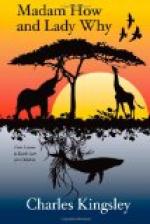C
/ | \
/ | \
A /—–+—–\
E
/ | \
/-----+-----\ E
Ground / | B \ Ground
---------/ | \------------
| D | | D | D |
--+-----+--+---+-----+------
| | | | |
|
Now look at this figure. It represents a section of a volcano; that is, one cut in half to show you the inside. A is the cone of cinders. B, the black line up through the middle, is the funnel, or crack, through which steam, ashes, lava, and everything else rises. C is the crater mouth. D D D, which looks broken, are the old rocks which the steam heaved up and burst before it could get out. And what are the black lines across, marked E E E? They are the streams of lava which have burrowed out, some covered up again in cinders, some lying bare in the open air, some still inside the cone, bracing it together, holding it up. Something like this is the inside of a volcano.
CHAPTER IV—THE TRANSFORMATIONS OF A GRAIN OF SOIL
Why, you ask, are there such terrible things as volcanos? Of what use can they be?
They are of use enough, my child; and of many more uses, doubt not, than we know as yet, or ever shall know. But of one of their uses I can tell you.
They make, or help to make, divers and sundry curious things, from gunpowder to your body and mine.
What? I can understand their helping to make gunpowder, because the sulphur in it is often found round volcanos; and I know the story of the brave Spaniard who, when his fellows wanted materials for gunpowder, had himself lowered in a basket down the crater of a South American volcano, and gathered sulphur for them off the burning cliffs: but how can volcanos help to make me? Am I made of lava? Or is there lava in me?
My child, I did not say that volcanos helped to make you. I said that they helped to make your body; which is a very different matter, as I beg you to remember, now and always. Your body is no more you yourself than the hoop which you trundle, or the pony which you ride. It is, like them, your servant, your tool, your instrument, your organ, with which you work: and a very useful, trusty, cunningly-contrived organ it is; and therefore I advise you to make good use of it, for you are responsible for it. But you yourself are not your body, or your brain, but something else, which we call your soul, your spirit, your life. And that “you yourself” would remain just the same if it were taken out of your body, and put into the body of a bee, or of a lion, or any other body; or into no body at all. At least so I believe; and so, I am happy to say, nine hundred and ninety-nine thousand nine hundred and ninety-nine people out of every million have always believed, because they have used their human instincts and their common sense, and have obeyed (without knowing it) the warning of a great and good philosopher called Herder, that “The organ is in no case the power which works by it;” which is as much as to say, that the engine is not the engine-driver, nor the spade the gardener.




